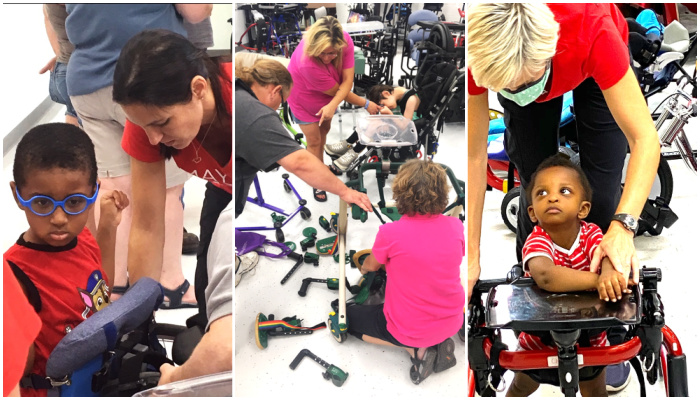Five Steps to Finding Joy: Faith and the Journey of Parenting with Special Needs

When we pray the Rosary, the Joyful Mysteries invite us to reflect on moments that reveal profound spiritual truths. Yet, if you’re like me, you may wonder how these events represent joy. It’s clear why the Sorrowful Mysteries express sorrow or the Glorious Mysteries shine with glory, but the Joyful Mysteries have often puzzled me. Of course, the birth of Jesus overflows with joy, but how do we find joy in visiting an elderly cousin or in the worry and strain of searching for a lost child in Jerusalem?
Recently, I listened to a podcast with Dr. Mike Scherschligt from Holy Family School of Faith that helped me see these mysteries in a new way. Each mystery carries a unique lesson for joy, not necessarily as an easy feeling of happiness but more as a deeper, enduring state that we can cultivate, even in hardship. In these five mysteries, we encounter acceptance, selflessness, humility, gratitude, and patience, virtues that hold transformative power in our lives, especially for those of us caring for children with disabilities.
1. Acceptance in the Annunciation

And Mary said, “Behold, I am the handmaid of the Lord; let it be to me according to your word.” And the angel departed from her. — Luke 1:38
In the Annunciation, the angel Gabriel comes to Mary with an invitation that will transform her life: to become the mother of Jesus. Mary may have been afraid, uncertain, and unprepared for what lay ahead, yet she responds graciously. She listens, she trusts, and, in full surrender, she accepts the mission God has chosen for her. She aligns her will with God’s, embracing a future she didn’t plan and may not fully understand.
As parents of children with disabilities, we face our own battle of acceptance. The journey we find ourselves on may not be the one we envisioned. It might be filled with challenges, unexpected trials, and sacrifices. Yet, like Mary, we’re invited to trust that this path holds a purpose beyond what we can see.
Acceptance here doesn’t mean resignation; it means embracing our role with an open heart and a willingness to be led. In the words of Dr. Scherschligt, we are called to “docility,” to be teachable, to lean into God’s guidance and wisdom, and to believe that this journey, while difficult, is filled with divine intention.
We may not always know what is best for ourselves or our children, but God does. When we align our hearts with His will, accepting our journey with open hands, we find a peace and a joy that transcend understanding, a joy that Mary exemplifies as she steps forward in faith.
2. Selflessness in the Visitation

In those days Mary arose and went with haste into the hill country, to a city of Judah. — Luke 1:39
When Mary learns that her cousin Elizabeth is expecting a child, her immediate response is one of loving service. Without delay, she sets out on a long, likely difficult journey to be by Elizabeth’s side. Mary’s instinct isn’t to linger in her own joy or focus on the challenges she might soon face; instead, she places Elizabeth’s needs first.
For parents of children with disabilities, the Visitation offers a beautiful example of selflessness. Like Mary, we’re often called to put aside our own concerns and focus on the needs of others, especially our children. This selflessness is not only a way to care for them but also a path to discovering a unique kind of joy.
In moments when caregiving feels overwhelming, remember that true joy often comes when we step out of ourselves and attend to the needs of those we love. Mary’s example reminds us that selflessness doesn’t drain us; instead, it clears away selfish thoughts and opens space for the simple, quiet joy of serving others.
3. Humility in the Nativity

And while they were there, the time came for her to be delivered. And she gave birth to her first-born son and wrapped him in swaddling cloths, and laid him in a manger, because there was no place for them in the inn. – Luke 2:6-7
The birth of a child is a moment of joy, but the Nativity reveals much more than celebration. Mary and Joseph find themselves in a humble setting, with their newborn in a manger. They don’t have the comforts they might have hoped for, yet they accept these circumstances with peace. Their humble setting doesn’t rob them of joy but deepens their trust and opens their hearts.
For parents of children with disabilities, the Nativity teaches us about the freedom found in humility. Like Mary and Joseph, we can feel pressured to control every detail, to anticipate every need, or to ward off every uncertainty for our children. And yet, as Dr. Scherschligt mentions the German Catholic philosopher Josef Pieper observed, this intense desire for control often fuels anxiety and drains us of joy: “All neurosis seems to have as a common symptom an egocentric anxiety, a tense and self-centered concern for security, an inability to let go.” When we let go of the need to orchestrate everything perfectly, we open ourselves to God’s grace.
Mary and Joseph teach us that humility means being flexible, recognizing our limitations, and allowing ourselves to be guided by faith. As we release our grip of control and embrace humility, we create space for unexpected joy that emerges not from perfect circumstances but from a willingness to trust God with all that lies beyond our reach.
4. Gratitude in the Presentation

And when the time came for their purification according to the law of Moses, they brought him up to Jerusalem to present him to the Lord. — Luke 2:22
In the Presentation, Mary and Joseph bring Jesus to the Temple, offering a humble sacrifice of turtledoves or pigeons as a way of giving thanks to God. Their act is one of gratitude, recognizing the gift they’ve been given and honoring its source. This moment shows us that gratitude is a vital part of joy, a way to complete the happiness we experience by acknowledging its source.
For parents of children with disabilities, cultivating gratitude can be a powerful way to embrace joy, even in challenging moments. As we face the unique demands of caregiving, it can be easy to overlook the small, precious moments that bring light to our days. Yet, just as Mary and Joseph offer a sacrifice of thanksgiving, we too can pause and reflect: For what am I grateful? and To whom am I grateful?
Happiness flows from gratitude. When we take time to recognize and give thanks for our blessings, even the smallest ones, we open our hearts to joy. Gratitude helps us see our children’s lives, and our own, through a lens of love and appreciation, allowing joy to settle deeply within us.
5. Patience in Finding Jesus

And when they did not find him, they returned to Jerusalem, seeking him. After three days they found him in the temple, sitting among the teachers, listening to them and asking them questions. — Luke 2:45-46
When Mary and Joseph realize that Jesus is missing, they face every parent’s worst fear. Jesus, their beloved child, is nowhere to be found, and they endure three agonizing days before finally discovering him in the Temple. This experience demands incredible patience, a patience rooted in hope and trust in God’s timing.
For parents of children with disabilities, the lesson of patience is one we encounter often. Like Mary and Joseph, we may find ourselves grappling with situations we did not choose, do not like, cannot change, and may not fully understand. Whether we’re facing delays in progress, repeated setbacks, or overwhelming uncertainty, patience becomes a way to persevere.
Patience, as Dr. Scherschligt describes, is a form of courage. It’s the ability to endure hardships cheerfully, to trust that God allows difficulties not to harm us but to shape us. When we trust that God is at work, even when we cannot see or understand His plan, we gain the strength to carry on with confidence. Patience allows us to face our challenges not with frustration or despair but with the quiet joy of knowing that, like Mary and Joseph, we are always held in God’s care and love.

Related Posts

Special Needs
5 Spring Cleaning Tips for Families of Children with Disabilities
Spring cleaning is an opportunity to create a more accessible, organized, and supportive space for your child with disabilities. Declutter, deep clean, and refresh!

Visual Impairment
The Gift of Understanding: How a Young Child Helps His Blind Father Navigate Life
When a parent is blind, it’s natural for people to wonder how their sighted child will adapt. Will they struggle to understand their parent’s needs? Will they feel burdened by...

Assistive Technology, Support
May We Help: Engineering Independence for People with Disabilities
May We Help is dedicated to designing and building custom solutions that help individuals of all ages achieve mobility, access, and independence, all at no cost.